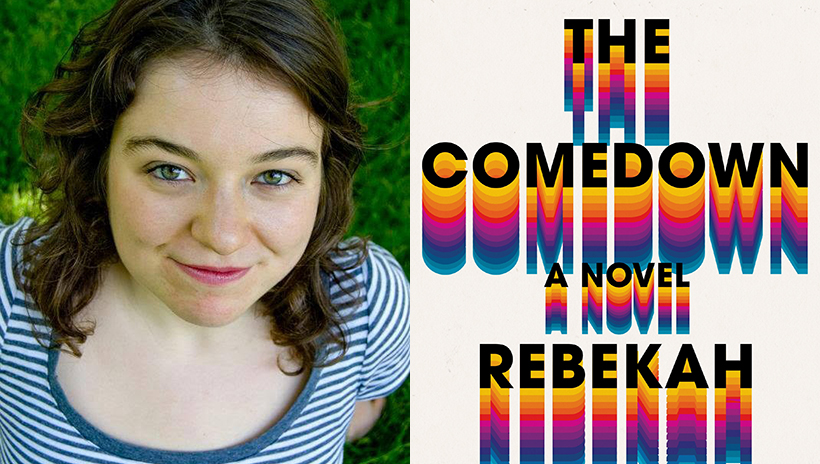In a recent opinion piece in The New York Times, columnist David Brooks argued that describing people by ethnic, racial, religious, gender, and political identities -- say, "straight Jewish Democrat' or "African-American Republican feminist"-- diminishes their essential selves.
"A whole lifetime of experience, joy, and pain goes into that complexity, and it insults their lives to try to reduce them to a label that ignores that," he wrote.
While she might disagree with most of his political views, 28-year-old Chicago writer Rebekah Frumkin, whose first published novel, The Comedown , is receiving critical acclaim, offers a similar understanding of individual personhood as mutable, murky, and oftentimes frustratingly confusing.
"To embrace their humanity fully," said Frumkin, "you've got to see people for who they are beyond their identities."
Frumkin aims to do so in Comedown , which is peopled with characters defying stereotypes and facile definitions.
As author Nathan Hill, critiquing Comedown in a rave review in The New York Times Book Review , wrote, "We tend to think of our 'selves' as consistent and solid things, but this book reminds us that who we are is incredibly malleable and fluid."
The book, on the surface, is a story of a drug deal gone bad. Beneath it, though, is a probing examination of how individuals from two families -- one Jewish, one African-American -- have written narratives about themselves that often require rewriting.
It's a subject, Frumkin said, that is of never-ending fascination to her -- and one with which she is well acquainted.
"I'm dedicating my life to figuring out other people, she said, "even though they can be exhausting and irritating."
Frumkin herself has had close encounters with exhausting and irritating people -- to put it kindly -- and she readily owns up to a personal identity that cannot be so readily defined by a string of reductive adjectives.
The only child of an emergency room physician father and a Jungian-trained therapist mother, Frumkin grew up in the Waukegan and Libertyville areas of suburban Chicago, where, she said, she felt the slings and arrows of anti-Semitism and homophobia.
"I was bullied for being gay," Frumkin said, even before she came out as a member of the LGBTQ community.
As for anti-Jewish sentiment, she was subjected to comments in school about Jews and their associations with money. Many of her classmates, she said, assumed that she had stronger ties to the Jewish community than she actually had because of her surname. In fact, she noted, while her father is the product of a Jewish New York home, her mother's family was, on the whole, white Anglo-Saxon Protestant.
Early on, perhaps as a salve to the wounds she felt as an outsider in school, Frumkin took up writing. Though she was admitted to several Ivy League institutions, including Princeton, she chose to attend a small elite college in Minnesota, Carleton College. There, she studied philosophy and took a number of Jewish studies classes, including a survey of Jewish thinkers -- from Maimonides to Franz Kafka.
"I related to Kafka," Frumkin said. "He wrote so beautifully about alienation, and he was funny, too."
Based on her writing while at Carleton, Frumkin won a much-coveted spot at the Iowa Writers' Workshop, where she studied with novelist and short story writer Ethan Canin, among others. Soon after she earned her MFA, she embarked on another master's degree--at Northwestern University's Medill School of Journalism.
Today, Frumkin is making as much a name for herself in the area of non-fiction as fiction. Several years ago, she wrote a series of highly self-revealing essays for McSweeney's publishing house, in which she described her struggles with bipolar disorder, with which she was diagnosed at 22. Her work has also appeared in the literary magazine Granta and the Chicago-based In These Times .
To earn her keep, Frumkin has balanced her writing with teaching. Following stints at the University of Illinois at Chicago and Northeastern Illinois University, she will assume a yearlong position as Visiting Assistant Professor of Creative Writing at Louisiana State University.
Frumkin has also begun working on her next book, in which one of the major characters has bipolar disorder.
"As embarrassed as I am about [discussing my] bipolar disorder, I write about it," she said, "in the hope that people can save their lives and get the help that they need."
That level of honesty, coupled with a gift for language and an unquenchable curiosity about the human condition, will no doubt draw readers to her.






.jpg)



